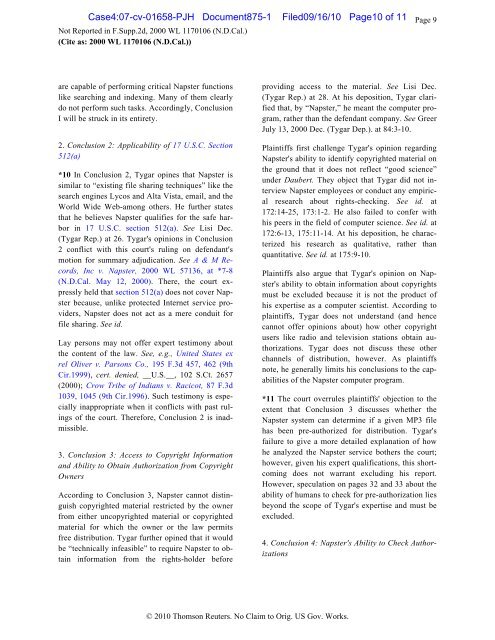exhibit 2 - SAP Lawsuit Portal
exhibit 2 - SAP Lawsuit Portal
exhibit 2 - SAP Lawsuit Portal
You also want an ePaper? Increase the reach of your titles
YUMPU automatically turns print PDFs into web optimized ePapers that Google loves.
Case4:07-cv-01658-PJH Document875-1 Filed09/16/10 Page10 of 11<br />
Not Reported in F.Supp.2d, 2000 WL 1170106 (N.D.Cal.)<br />
(Cite as: 2000 WL 1170106 (N.D.Cal.))<br />
are capable of performing critical Napster functions<br />
like searching and indexing. Many of them clearly<br />
do not perform such tasks. Accordingly, Conclusion<br />
I will be struck in its entirety.<br />
2. Conclusion 2: Applicability of 17 U.S.C. Section<br />
512(a)<br />
*10 In Conclusion 2, Tygar opines that Napster is<br />
similar to “existing file sharing techniques” like the<br />
search engines Lycos and Alta Vista, email, and the<br />
World Wide Web-among others. He further states<br />
that he believes Napster qualifies for the safe harbor<br />
in 17 U.S.C. section 512(a). See Lisi Dec.<br />
(Tygar Rep.) at 26. Tygar's opinions in Conclusion<br />
2 conflict with this court's ruling on defendant's<br />
motion for summary adjudication. See A & M Records,<br />
Inc v. Napster, 2000 WL 57136, at *7-8<br />
(N.D.Cal. May 12, 2000). There, the court expressly<br />
held that section 512(a) does not cover Napster<br />
because, unlike protected Internet service providers,<br />
Napster does not act as a mere conduit for<br />
file sharing. See id.<br />
Lay persons may not offer expert testimony about<br />
the content of the law. See, e.g., United States ex<br />
rel Oliver v. Parsons Co., 195 F.3d 457, 462 (9th<br />
Cir.1999), cert. denied, __U.S.__, 102 S.Ct. 2657<br />
(2000); Crow Tribe of Indians v. Racicot, 87 F.3d<br />
1039, 1045 (9th Cir.1996). Such testimony is especially<br />
inappropriate when it conflicts with past rulings<br />
of the court. Therefore, Conclusion 2 is inadmissible.<br />
3. Conclusion 3: Access to Copyright Information<br />
and Ability to Obtain Authorization from Copyright<br />
Owners<br />
According to Conclusion 3, Napster cannot distinguish<br />
copyrighted material restricted by the owner<br />
from either uncopyrighted material or copyrighted<br />
material for which the owner or the law permits<br />
free distribution. Tygar further opined that it would<br />
be “technically infeasible” to require Napster to obtain<br />
information from the rights-holder before<br />
Page 9<br />
providing access to the material. See Lisi Dec.<br />
(Tygar Rep.) at 28. At his deposition, Tygar clarified<br />
that, by “Napster,” he meant the computer program,<br />
rather than the defendant company. See Greer<br />
July 13, 2000 Dec. (Tygar Dep.). at 84:3-10.<br />
Plaintiffs first challenge Tygar's opinion regarding<br />
Napster's ability to identify copyrighted material on<br />
the ground that it does not reflect “good science”<br />
under Daubert. They object that Tygar did not interview<br />
Napster employees or conduct any empirical<br />
research about rights-checking. See id. at<br />
172:14-25, 173:1-2. He also failed to confer with<br />
his peers in the field of computer science. See id. at<br />
172:6-13, 175:11-14. At his deposition, he characterized<br />
his research as qualitative, rather than<br />
quantitative. See id. at 175:9-10.<br />
Plaintiffs also argue that Tygar's opinion on Napster's<br />
ability to obtain information about copyrights<br />
must be excluded because it is not the product of<br />
his expertise as a computer scientist. According to<br />
plaintiffs, Tygar does not understand (and hence<br />
cannot offer opinions about) how other copyright<br />
users like radio and television stations obtain authorizations.<br />
Tygar does not discuss these other<br />
channels of distribution, however. As plaintiffs<br />
note, he generally limits his conclusions to the capabilities<br />
of the Napster computer program.<br />
*11 The court overrules plaintiffs' objection to the<br />
extent that Conclusion 3 discusses whether the<br />
Napster system can determine if a given MP3 file<br />
has been pre-authorized for distribution. Tygar's<br />
failure to give a more detailed explanation of how<br />
he analyzed the Napster service bothers the court;<br />
however, given his expert qualifications, this shortcoming<br />
does not warrant excluding his report.<br />
However, speculation on pages 32 and 33 about the<br />
ability of humans to check for pre-authorization lies<br />
beyond the scope of Tygar's expertise and must be<br />
excluded.<br />
4. Conclusion 4: Napster's Ability to Check Authorizations<br />
© 2010 Thomson Reuters. No Claim to Orig. US Gov. Works.


